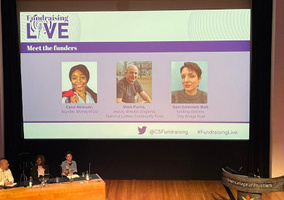The Charity Commission has been urged to make a public commitment to antiracism and to report on diversity data in the sector.
Education charity Money4You said that, as far as it can tell, the Charity Commission has never had a person of colour as its chair or chief charity commissioner.
The charity said it was difficult to judge whether the Commission’s efforts to encourage charities to recruit a diverse range of trustees are effective, because it does not monitor diversity in the sector “in a sufficiently systematic way”.
It found that £29.8m out of £112m-worth of grants made by 10 funders within one-year funding periods went to organisations “with what appear to be all-white boards”.
The charity found that the average amount awarded to organisations with mostly white male trustees was £1.23m, compared to £406,000 for those with a majority of people of colour on their board.
It reported a “triangle effect” when comparing grant amounts with smaller grants going to a diverse range of organisations but larger grants going to organisations with “a large proportion of white people and men” on their board.
Money4You said charities should be asked to describe and explain the level of lived experience in their leadership structures when they publish annual reports after finding that a sample of large charities failed to have a dedicated executive, board member, or senior committee.
“Far too often, large and influential charities treat lived experience as a resource for researchers, not as a leadership quality,” its report says.
Diversity data reporting
Money4You recommended that the Commission should make a public commitment to antiracism and antiracist practices and renewed calls for it to collect and report on diversity data in the sector.
The charity said the regulator should publish a review of diversity and inclusion in appointments to the post of chair, using its own data and within best practice on data protection, as soon as possible.
It called on DCMS to publish a complete list of chief charity commissioners and chairs of the Commission as far back as records can be found, or commission the archival work necessary to compile a list.
The Commission declined to comment on the report’s findings or recommendations.
In a speech earlier this week, Commission chief executive Helen Stephenson said: “Our research to date has shown us a lot about the attitudes and experiences of trustees but we – and many others – would like to know more about the trustees themselves, so as to enable the sector to work out what the barriers to trusteeship might be, and start to break those barriers down.
“We are now actively looking with partners to develop further research in this area, so as in due course to supply data to help this process of promoting wider trusteeship.”
‘What doesn’t get measured doesn’t get done’
Money4You chief executive AmickyCarol Akiwumi said charities who have expressed a commitment to diversity should report data to support this.
“A lot of charities, for many years now, have said, voluntarily, that they are committed to diversity, equity and inclusion,” she told Civil Society.
“So, for me, it's not such a far step to report on this. If that is truly the case, then there should be absolutely no problems on reporting on that and being transparent about it.”
Akiwumi said that many charities already provide diversity data about their leadership team and trustee board to funders when they apply for grants.
“I sit on some grant assessment panels and it is the case that that’s part of the criteria that they are tracking anyway,” she said.
“So, if we’re willing to submit that information in order to apply for a grant, then there should be nothing stopping us from just including it in the annual report.”
Asked what else charities should do besides reporting their diversity data, Akiwumi said: “What doesn’t get measured doesn’t get done. That’s the truth.
“But alongside measurements, there needs to be transparency. Because that is the single most critical thing that helps people to adjust their behaviour.
“That’s how we're wired as humans. The minute people are required to be transparent about something, they give more thought and effort towards it.”












